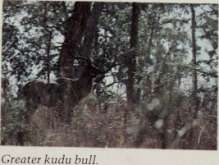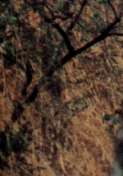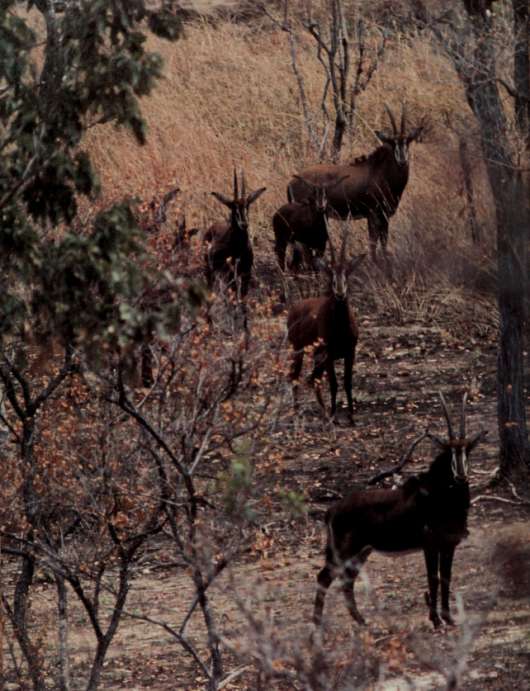Sand rivers (9 page)

-4.
^
%.
%

f

%-'
/

■
>^^*

/^
>
*
t
'^t

SAND RIVERS
later gave me the details of this story, the year was 1973 and the camp had in fact been his own camp - the girl was using it while he was working in Nairobi - and she had been taken, not in darkness, but about one o'clock in the afternoon. Since she lived alone no one reported her absence for two or three weeks, and even then, it was assumed that she had simply gone off to Nairobi; it was not until her car was discovered in the shed, full of rotting food and safari equipment, that a search party was raised, about five months after her death. "One of the rangers found her skull, which was still intact; 1 was later that week to find her hair, safari clothes, and books. The evidence of scattered books, a few baked tracks, and the damage to the clothes was enough to tell the story. It would seem that she was killed by the lion grasping her neck, but such details are more speculative than real." '
From a point just past an isolated bush located near the path to Dr. Western's camp, the trail of dropped books was found leading toward the house; apparently a lion had been hidden by the bush, the girl had walked past it, and the books had been scattered as she fled for the house upon being chased. Since the skull was intact, one must suppose that the poor girl had lived briefly, aware of her own obliteration in the heat of the African day.
Out in the black woods all around, the bush fires were still burning, and the soft African voices came and went on the east wind; during the night I heard someone rise now and again to throw more deadwood on the fires. Until this journey, Renatus was inexperienced with animals except those seen from the safety of Hugo's car, and Mwakupalu, on a recent safari into Amboseli, had been so frightened by park elephants that came boldly into camp that he had cut a hole in the back of his new tent and fled into the bush. Yet it was neither of these two but the old game scout who got up from his blanket by the Africans' fire on the far side of the fallen tree to feed the blaze that warned away the big night animals.
Unknown bird calls, unknown stars of the southern hemisphere - I listened to the keening of a lone mosquito, under the black branches that traced the blue-black heavens overhead. A thousand frogs trilled, and the Southern Cross was lying on its side, far away down the night sky toward the Cape of Good Hope.
Brian had reminded us that in the morning we should shake our shoes out, to make certain that they did not shelter scorpions. Since Brian, perhaps to enhance our adventure, seemed fond of pointing out the perils of safari, 1 did not take this very seriously. But the next morning, when 1 sat down on the big log by the fire where Mwakupalu was making porridge, a large and shiny charcoal-colored scorpion clambered out on to the gray wood-ash beside my boot.
(Left) Sable antelope.
\S7
PETER MATTHIESSEN
According to Saidi, who had talked to the game scouts at Kingupira, the track to our next destination, at Madaba, had been allowed to deteriorate so badly that it was now impassable for Bonham's truck; the alternative was a long roundabout route, usmg a side track off the main route to the south. Under the circumstances it seemed sensible to eliminate the second base camp we had planned there and proceed directly to the far south, making only a side trip to Madaba m order to collect David Paterson. When I suggested this, Hugo promptly agreed; he was anxious to have a long-term base so that he could give any photographic project all the time required. Brian also agreed, after a moment. In any case, we would have to return to the Kingupira track first thing in the morning; it was crucial to cut off Rick Bonham, who was leaving Kingupira for Madaba that day with a lorry load of fuel and food.
We headed cross-country. In a stately wood of tall, well-spaced trees and open grassland from which huge strawberry-colored crickets rose before the tires, a grove of small hookthorn acacias, like old orchard trees, were in white blossom. Toward a big bare leadwood where two coucals were duetting, emptying strange notes from a magic flagon, flew the first new species (a "life bird", as ornithologists say, meaning one never seen before) that I have come across in the Selous - the violet-crested turaco, big, soft blue-gray and forest green, flashing the beautiful crimson flight feathers that are found in most members of this family.
We arrived at the main track toward the south just in time to head off Bonham's lorry. Rick was pleased by the new plan, which would eliminate the trouble of the second base camp; he would take this cargo straight on south to the Mbarangandu River. Anyway, he had bad news about Madaba. A party of American hunters who had leased a Madaba block for a three-week safari had quit in disgust after two days. The source of most of this information was a professional hunter from Zambia, who had come through Kingupira the day before; having spent three weeks in the Madaba region, working with a Tanzanian hunter under the auspices of Tanzanian Wildlife Safaris, the government safari company, he had found only two elephants worth shooting for their ivory. He had also heard that T.W.S. had killed 126 elephants that year in order to subsidize their losing operation, and that none of these elephants had ivory bigger than 50 pounds to a side, which is only average (a very good bull might carry twice that weight or even more). Worse, he had seen what looked like places where helicopters had landed, which seemed to suggest "official" poaching, or that the animals were being killed, as rumored, to help pay for the war in Uganda.
Richard Bonham is a fair-haired wiry young man of twenty-five, slightly strung out by bilharzia, and rather dour in the laconic style of bush types everywhere throughout East Africa, perhaps because he was still exhausted from the stress of getting this safari into Tanzania. "1
SAND RIVERS
thought the Selous was the last stronghold, man. And now the poachers are right in there in the very middle of the Reserve."
"Those bastards," Brian Nicholson said. He spoke very quietly, slumped behind the wheel in the empty woods. Then he raised his eyes. "Some of the biggest ivory in the Selous was right there around Madaba, Rick. Discouraging, isn't it? And they must be hammering them in this district, too. I hadn't thought it would be possible to be three days in the Selous and not come across a single elephant, but now I'm beginning to see why."
When Rick was gone, we continued northeast toward Kingupira. But soon Brian turned off northward, arriving eventually at a small sand river, a channel of fine white quartzite sand perhaps twenty yards wide that the old Land Rover, with its broken half shaft, couKl not cross. In the east wind, big thick purple-red blossoms of kigelia fell silently to the dry ground. With Saidi as gunbearer, the Warden set off to investigate the far bank on foot, and sensing that he wished to think things over, 1 wandered in the opposite direction, looking at birds. A beautiful red-headed weaver (unlike most weavers, rather solitary) climbed about in a pod mahogany or "lucky bean" with fresh green leaves that danced and glistened in the morning sun, and a parrot preened its vivid green in the fresh parrot-green of an albizzia. The ubiquitous white-crowned sparrow weavers squabbled domestically at woven nests like balls of hay among the yellow blossoms of a cassia, and around the bare clerestory of a great baobab, striped swallow wove fine, unseen strands of sweet, unswallowlike song.
Returning, Nicholson said tersely, "I'm discouraged. It's everything I'm hearing, not only from Rick but from the game scouts. I'm glad I left the Selous, you know; if I was trying to run this place in the face of what's been going on, I'd be round the bend." He got into his Land Rover and once again slumped behind the wheel. "You're right, Peter. Let's head straight down to the Mbarangandu. Maybe these bastards haven't been working that far south, and there will still be something left to see." Leaving Saidi and his bunduki (rifle) behind to guard Hugo and me from the missing animals, he set off for the Kingupira camp.
On the way home, he told us later, he had stopped off at the Miombo Research Center to see what he could learn from the Game Research Officer as to the whereabouts of the Selous's famous elephants. "The elephants are now declining," the Game Research Officer informed him. "I can see that," agreed Brian. "Why?" "They are dying from some unknown disease. We find them dead." And he showed Brian a whole roomful of tusks that were now the property of the government. Recounting this, Brian rolled his eyes in exasperation; he suspected the worst. But he had already convinced himself that things would be different in the south, and was eager to go as soon as possible. At Kingupira, he had hired eight Ngindo who would help repair the
PETER MATTHIESSEN
neglected airstrip down on the Mbarangandu River and serve as porters on the foot safari that he and I would make in the far south, beyond the junction of the Luwegu and Mbarangandu. "It won't be like this down there, I can tell you," the Warden told me. "The Selous is the finest wildlife habitat in Africa, and the Mbarangandu is the heart of it."
Making our way slowly back toward camp, Hugo and 1 stopped wherever something caught our eyes. I observed the wood hoopoes and helmet-shrikes and a beautiful violet-tipped courser, while he photographed an impala herd on the black ground of a brown wood, and the white skull of an elephant against the blackened earth.